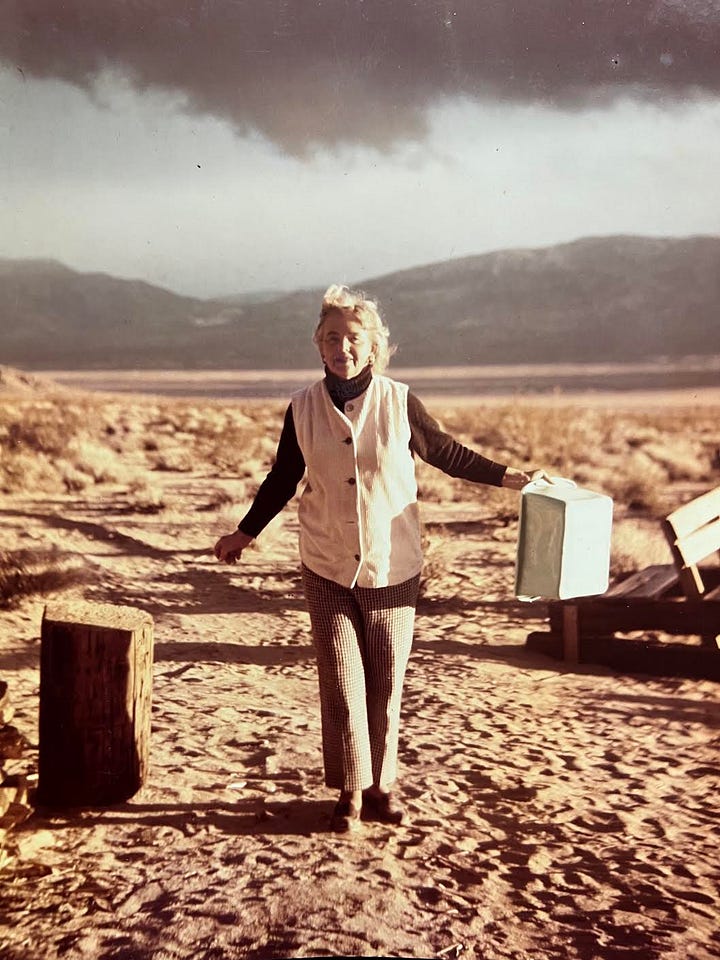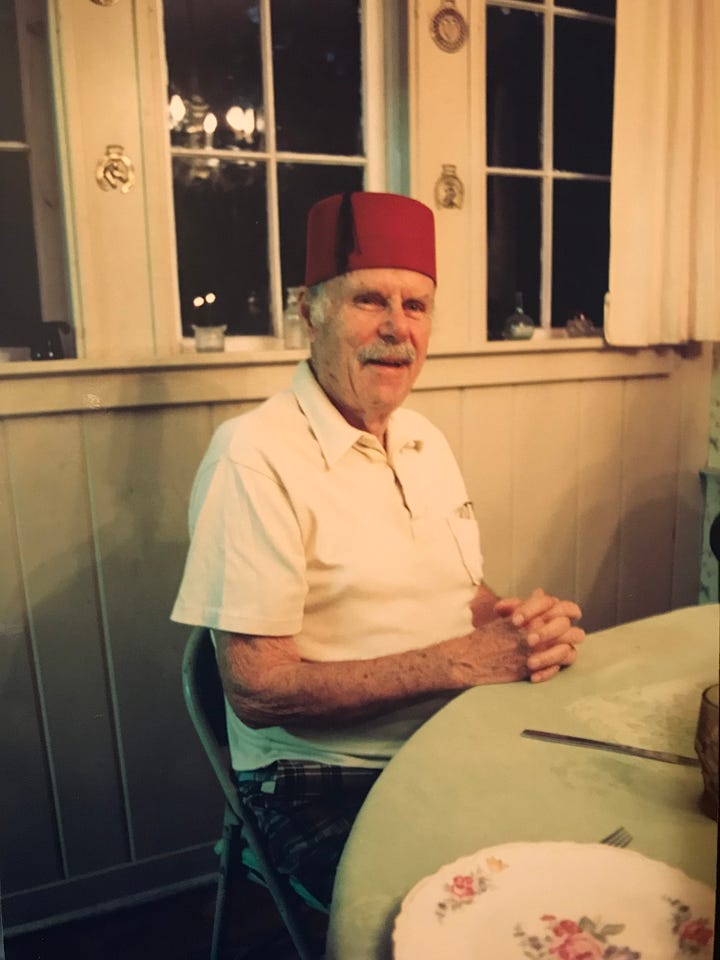I have mixed feelings about the desert. On one hand it’s a dark place where you can’t hide from yourself. Where the ghosts of dinosaurs mix with meteors fallen from the sky. I think of the cartoon backdrop of Road Runner and Coyote. The endless battles that involve old Wile E. falling off cliffs to the rock-hard ground, peeling himself up and taking one step before dissolving into a pile of dust. Nothing is not extreme. Nothing is not vast and endless and lonely.
But then there are the stars! The stillness and peace and my grandparents, Don and Mary, who lived there for 5 months out of the year in a house with no electricity or running water. When I say they lived in the desert, I mean they lived in the desert, just the ground and the sky and a little house my grandfather built himself.
I think about them and that silent place a lot, especially now that it seems a little more appealing. Why is it you think of all the conversations you want to have with people you love as soon as you can’t have them anymore? I used to write letters to my grandfather when I was little and he would write back on a piece of paper folded in half once and then in half again, so that you could read it like a book. He had small but very neat and legible handwriting that I loved. We were pen pals on and off all the way through college when I remember asking him huge important questions about the meaning of life and why people did what they did, like he was a wise man on a mountain-top. He ignored my questions, thankfully, writing instead about walking to the end of the road to pick up the mail, or about old boarding school days with some of the Barrymores who dropped their expensive raccoon coats on the floor and drank cough syrup out of long-necked bottles. He would sign off:
write again what you’re seeing with them big mysterious eyes, Love, GP
He built a bench for my grandmother, a place to sit during the day where she could listen to music and talk shows from her transistor radio, surrounded by rocks and tumbleweeds and lizards. It couldn’t have been an easy sell; my grandmother was a very social person and loved being around people (my grandfather was not, and did not), but she always talked about her bench as though it was a special kind of luxury. “I’d sit out there sometimes 4 hours a day!” she’d say, “I got the best reception!” I have seen photos of her on her bench wearing two overcoats, gloves, a big hat, and a blanket across her lap, her radio beside her, smiling like a movie star.
There’s no way to figure out why people do what they do, though it doesn’t stop me from trying. Maybe there are explanations, bad things that happened in childhood, unfortunate circumstances and unresolved conflicts that caused distrust and fear of others and the need to be alone. Hints of dark sides filled with wells of sadness and rage. Or maybe not. There was always humor, tinged with everything.
We used to watch a super 8 movie of GP pretending to suffocate a baby in a bassinet with a teddy bear. We would all fight over who the baby was. That’s me! No it’s me! No, me!
“Who was it, Don?” Nana would say, getting in on the action, staring right at him suggestively.
“It was little Billy Sandoyan”, GP would say without looking up from his book. Always it was a different name, Jimmy Mazurski, Felix Humperdink. “He wouldn’t stop crying”. We all gasped and sat up and looked at each other. Little heads turning from one cousin to another, hiding smiles. We’d look to my grandmother who was sadly shaking her head as if to say, “It had to be done”. Occasionally she would say, Oh Don, stop! Turn it off! and she was such a good actress we couldn’t tell if she was playing along or if she really meant it. Either way, we’d all yell, No, No, Leave it on. Leave it on. High voices, pleading and adamant.
GP needed to be alone. The pictures I have in my head are of his office door closed or from far away across a field in Rhode Island riding a tractor, first this way, then that way. Up close he was always kind and curious but intimidating. He was not physical, not a hugger or a toucher, but sometimes he would stand behind one of us and just rest his hand on top of our head, almost shy, unsure. My grandmother was the opposite. It felt like she was holding you even when she wasn’t, her voice low and direct and kind, what is it my darling? They had known each other since they were 12. And I wonder, how much goes unspoken with someone you have known so long?
If I wrote GP a letter now what would it say? I might ask him about Aldous Huxley or Krishnamurti, men he had known and admired. Or about his father, who he stopped speaking to long ago. Or maybe I would ask about the desert: why did you live out there, what was up with that? If I pressed him he might say it was a time to reflect, a time to connect to the earth and spend time with his favorite person. But I doubt it. In fact writing that just made me laugh at the thought of his reaction. But I wonder about the solitude, something everyone in my family, his children, grandchildren and great grandchildren have a connection to: a way of dealing. The solitude was passed down, that and a piece of his clear blue eyes.
There’s more to the story. It is one that expands and contracts. The memories become memories which become memories. But there are a few snaps that always remain, especially the last one. After my grandmother died, my grandfather moved out to the desert full time and lived there until he died too. My cousin found him in a chair, his hands still folded in his lap, listening to the radio.







I enjoyed this so much. Having grown up in the Sonoran desert of Texas and New Mexico, I know intimately about that immensity and silence — also about the surprisingly tough but ample life one can find there. The air after a rain, the old people I have known that lived there and built a life . . .
I also know what is being lost there, and I grieve for it. Thank you for sharing your story, and I hope there are many more.
So beautiful. Such a sense of aliveness in the silence. Of real relation and connection with your grandparents.